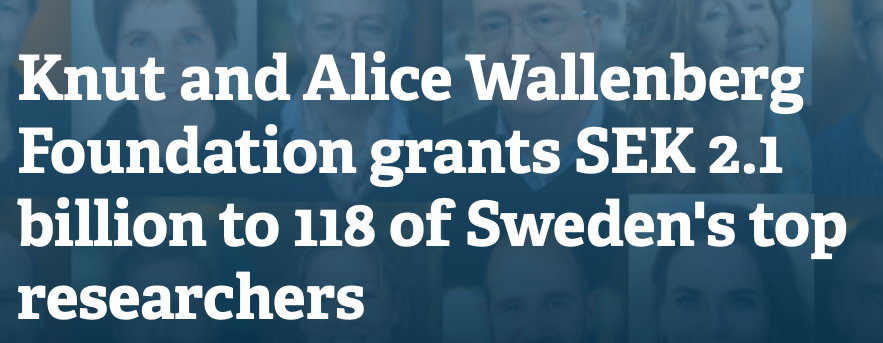
Four Digital Futures faculty members among Sweden’s top researchers granted by Knut and Alice Wallenberg Foundation
A press release published on 26 March 2024 announced that Knut and Alice Wallenberg Foundation grants SEK 2.1 billion to 118 of Sweden’s top researchers.
Among the researchers are four Digital Futures faculty members:
- Karl Henrik Johansson, Professor of networked control, KTH Royal Institute of Technology, Coming to terms with self-driving vehicles
- Dejan Kostic, Professor of Internetworking, KTH Royal Institute of Technology
- Danica Kragic Jensfelt, Professor of computer science, specializing in computer vision and robotics, KTH Royal Institute of Technology, Robots interacting with people
- Erik Lindahl, Professor of biophysics, Stockholm University, Research in brief: Examine structure and function of membrane proteins
The Knut and Alice Wallenberg Foundation continues its commitment to fostering groundbreaking research in Sweden with its Wallenberg Scholars program. Chair Peter Wallenberg Jr. emphasizes the importance of granting leading researchers unrestricted funds, allowing them to pursue daring research endeavours.
After a rigorous international peer review process, the Foundation has selected 118 researchers for five-year grants, totalling up to SEK 18 million for theoretical subjects and up to SEK 20 million for experimental subjects. Executive Director Sara Mazur highlights the Foundation’s dedication to supporting free basic research amidst target-oriented funding trends.
Significantly, 40% of the appointed Wallenberg Scholars are women, reflecting deliberate efforts to promote gender diversity without compromising scientific excellence. With a total investment of SEK 3.9 billion, including previous grants, the initiative underscores the Foundation’s enduring commitment to advancing curiosity-driven exploration and technological innovation in Sweden.
Knut and Alice Wallenberg Foundation is the largest private research financier in Sweden and one of the largest in Europe. The Foundation supports long-term, free basic research beneficial to Sweden, mainly in medicine, technology, and the natural sciences and has, since its establishment in 1917 awarded over SEK 37 billion in grants. In 2023, the yearly grants to excellent basic research and education in Sweden were in total almost SEK 2.2 billion.


